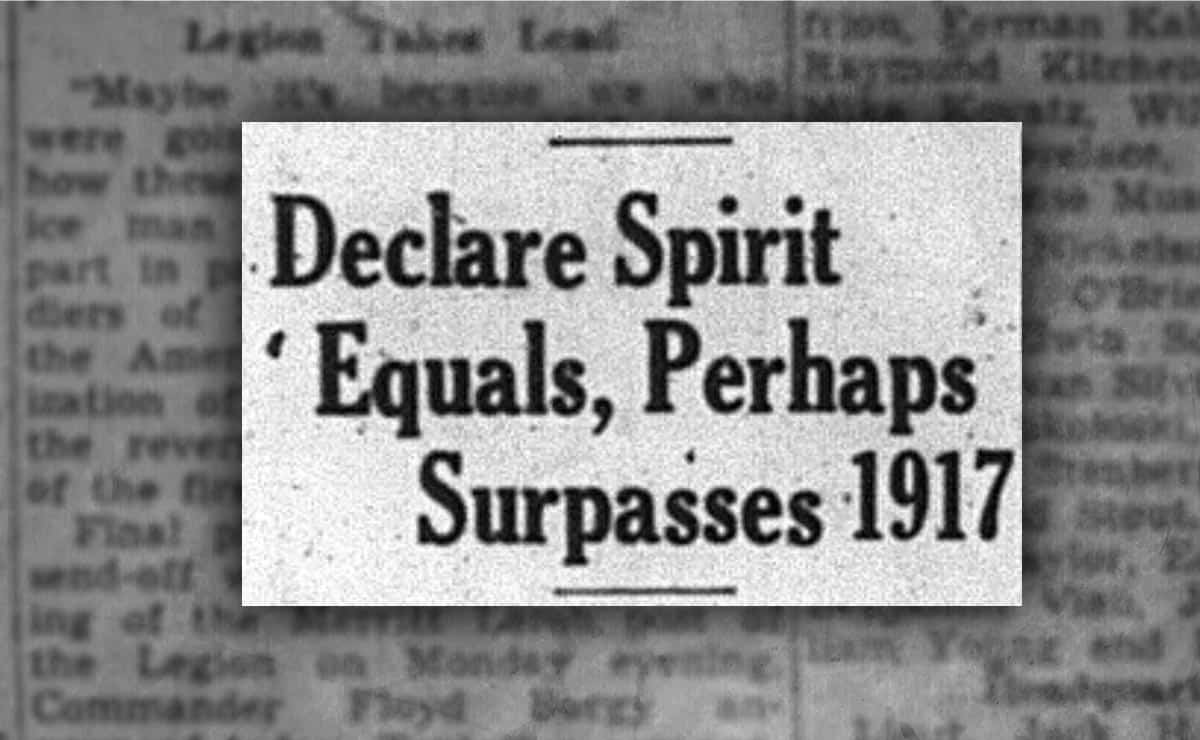
- Historical Date: October 18, 1940
- Location:Muskegon, MI
World War Veterans Commend Community on Sendoff Given Company G
Declare Spirit Equals, Perhaps Surpasses 1917
Merritt-Lamb Post to Plan Final Farewell Next Week, Men Going Listed.
In the opinion of Greater Muskegon veterans of the first World war, the community’s display of gratitude and civic expressions of good wishes being accorded local troops who will entrain next week for a year’s training in Louisiana equals demonstrations staged when Muskegon soldiers left for the front in 1917.
Some veterans believe that the 1940 functions, which will climax with a community sendoff at the railway station when the troops leave next week, surpass the demonstrations of the first World war.
The present spirit is especially remarkable when it is remembered that the situation today is still in an “emergency” stage while in 1917 the nation was already plunged into war, some veterans point out.
Legion Takes Lead
“Maybe it’s because we who were going away in 1917 know how these boys feel, one ex-service man commented. A leading part in paying tribute to the soldiers of 1940 is being taken by the American Legion, an organization of veterans who were on the reverse end of the send-offs of the first World war.
Final plans for the community send-off will be made at a meeting of the Merritt Lamb post of the Legion on Monday evening. Commander Floyd Bargy announced today. Tentative arrangements provide for a parade to the railroad station with a patriotic address and martial music by Greater Muskegon bands.
American Legion, Red Cross and other civic organizations are planning continued expressions of the community’s gratitude while the troops are encamped in Louisiana. Gifts of cigarettes, delicacies, recreation devices, radios and literature will be shipped to the Muskegon soldiers. Residents of the community will be given an opportunity to contribute.
Present members of the two units include:
Company G
Captain Herald Hootman, 1st Lt. Franklin J. Fazakerley, 2nd Lt. Russell A. Broner, 2nd Lt. Melvin W. Schultz and First Sgt. John Groulx. Sergeants – Roy Borgeson, Lester Compton, Harland D. Hammond, William Hart, Charles Miller and William Ziegler.Corporals – John Clark, Paul Dzur, Frank Huttz, Hugh Hislop, John Kwak, Bennie Richell, James Schultz, Arthur VanderMeulin and William Wills.
Privates, First Class – Clarence Deboef, Elzworth Esh, Mac Knowles, John Miller, Charles M. Olson, William Pehr, Robert Rensema and Dan Timmer.
Privates – Harvey Alexander, Paul Allen, Clarence Atwood, George Borgeson, James Broner, Willard Broner, Don Brown, Russell Buys, Charles Califf, Jay Cutler, Jay Dake, Jack Davis, Harry Deboef, Emory Domine, Lewis Downey, Peter Felcoslki,
John Gable, Matthew Gauthier, Harold Gleisner, Edward Groleau, Chaster Halasinski, Milton Hammond, Gerald Harp, John Hibbard, Forrest Hughes, Lamont Isley, Stanley Jastrzembski, Jack Jeffrion, Ferman Kaley, Lowell King, Raymond Kitche, Neil Koehler, Mike Kovatz, Willard LaVanture, Frank Lovelace, Homer Nichols and Alphonse Muscato.
Donald Nickelson, Jay Meyers, O’Donnell O’Brien, Fredrick Schmid, Elwin Schuyler, Worthy Scofield, Ivan Silvis, Robert Smith, Chester Sokoloski, William Sprecken, Carl Stenberg, Charles Stanley, Donald Stout, Edward Tapek, Charles Taylor, Edward Vanneten, Benjamin Viau, Joseph Yob, William Young and Harold Lund.
Headquarters Unit
Lieut. Jack Harber, TECHNICAL SERGEANT Herman T. Banninga, STAFF SERGEANT Jack E. Farber, CORPORALS Alfred E. Kirchenbauer, James R. Wolfcale.PRIVATE First Class Charles Schneider, and PRIVATES Melvin L. Berry, Joseph J. Budzynski, Donald W. Gardenour, Robert Hindes, Casmir R. Hozer, Harvey E. Klomperens, Richard W. Lewis, Bernard V. Markley, John A Maxwell, Nelson R. Showers, John W. Vos and Robert J. Yonkman.1
Reflections
It was the veterans of the first World War who best understood what it meant for the next generation of soldiers to leave home. The U.S. had not yet joined the war, but the community came out to give them a grand sendoff. A peacetime mobilization like this was unprecedented in U.S. history and, war or no war, the people of the community certainly understood what it meant for these young men to be called up and sent away. Company G was from Muskegon, and many of these young men knew each other, and were known by many others in the community. It was a nice gesture for the newspaper to print all of their names.
- “World War Veterans Commend Community on Sendoff Given Company G.” Muskegon Chronicle, 18 Oct. 1940, p. 13.

0 comments